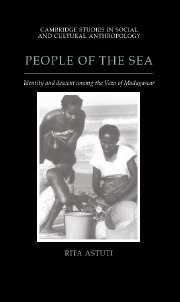Book contents
- Frontmatter
- Contents
- List of illustrations
- Acknowledgements
- 1 Introduction
- 2 Acting Vezo in the present
- 3 People without wisdom
- 4 Avoiding ties and bonds
- 5 Intermezzo
- 6 Kinship in the present and in the future
- 7 Separating life from death
- 8 Working for the dead
- 9 Conclusion
- Notes
- List of references
- Index
- Cambridge Studies in Social and Cultural Anthropology
6 - Kinship in the present and in the future
Published online by Cambridge University Press: 30 October 2009
- Frontmatter
- Contents
- List of illustrations
- Acknowledgements
- 1 Introduction
- 2 Acting Vezo in the present
- 3 People without wisdom
- 4 Avoiding ties and bonds
- 5 Intermezzo
- 6 Kinship in the present and in the future
- 7 Separating life from death
- 8 Working for the dead
- 9 Conclusion
- Notes
- List of references
- Index
- Cambridge Studies in Social and Cultural Anthropology
Summary
Kinship in the present
Dadilahy (grandfather) is a very old man (fantitra be). He does not know when he was born, but he thinks maybe in 1905. Dadilahy is very tired (rerake mare); he spends his days sitting in front of his house, which his grandchildren (zafy) built for him a few years ago. He occupies himself with making knives out of small scraps of iron that his grandchildren find for him. He hammers the iron on a flat stone; now and then he stops to recover his strength, and at times he falls asleep over his work. His grandchildren tease him that he spends more time sleeping than hammering, so it takes him many days before he finishes a blade and can start carving the handle. Although dadilahy is barely able to walk from his house to the kitchen, which is just 10 m away, he says he would go fishing if he could find a companion; at this, his daughter reminds him how weak his legs are and how bent his back is. A few hours later, in the evening, a small audience gathers around dadilahy to listen to him telling one of his many adventures at sea as a young man. He gives marvellously accurate details on the wind, the current, the waves and the position of the sail. His audience strains to hear his feeble voice, for his stories are always very engaging. His grandchildren say that he is a good story-teller (mahay mitantara ie).
- Type
- Chapter
- Information
- People of the SeaIdentity and Descent among the Vezo of Madagascar, pp. 80 - 105Publisher: Cambridge University PressPrint publication year: 1995

